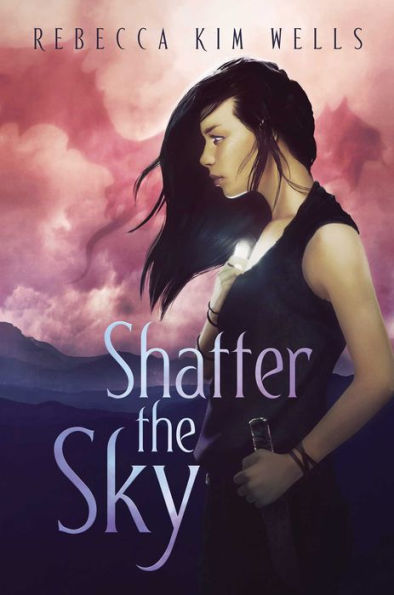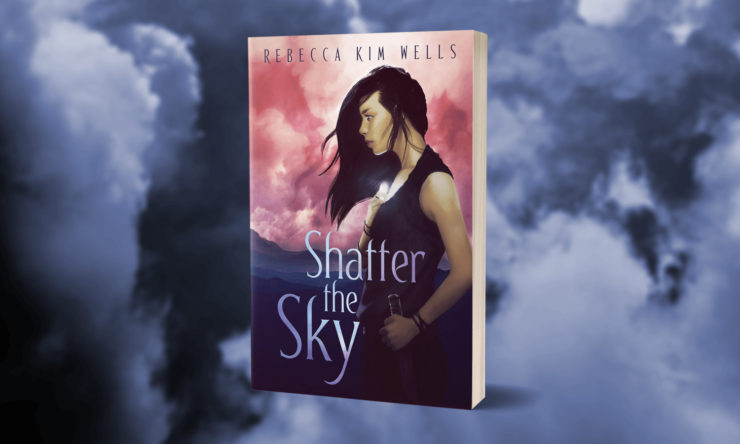It begins in the aftermath. Two young women, in love, in a nation conquered by a powerful emperor. The mountain nation of Ilvera dragonriders was subjugated a generation ago, encompassed by the rule of the Zefedi downmountainers. Verrans could not resist the colonizers, not when they were armed with the very dragons they’d stolen from Ilvera. Maren has a relatively unique identity within her village—her father is Zefedi and her mother is Verran. They are a loving family, complicating Maren’s relationship with the Zefedi rule, especially as physically, she takes after her father, with lighter brown skin than her girlfriend and most of her village.
Despite the political landscape of her home, Maren wants little more than to remain on the mountain and live out her days in its peace and beauty. Her priority is her girlfriend, Kaia. As long as they’re together, she wants for nothing. Kaia, on the other hand, can’t wait to leave—to venture out past the ruins on the other side of the lake, to cross the mountain range of Anetka, to travel south to the ocean, and finally, to prove herself to the emperor, the Flame of the West, in hopes that he will christen her a Talon, one of his elite dragon guard. Even though Maren doesn’t share these aspirations, she would do anything for her, and so she plans to join Kaia on her adventures.
Their plans are shattered upon the arrival of the Aurati seers. Most Aurati are merely a standard mark of empire, integrated into Verran communities, but the seers are unique, their prophecies mysterious, powerful, and capable of shaping political consequence. Every seven years, they make a pilgrimage up the mountain, and occasionally, take a girl with them when they leave.
Maren is terrified it will happen to her—but nothing could prepare her for the moment they choose Kaia.
Brave, brilliant, adventurous Kaia, destined for greatness, snatched away by mysterious agents of empire. Maren can hardly believe it. The void left in Kaia’s absence is one she doesn’t know how to fill on her own. Worse, she begins to dream of dark and terrible things happening to her heartmate, dreams that her mother believes might resonate with the longstanding Verran affinity for dragons. And so she hatches a reckless plan—to run away downmountain, steal one of the emperor’s dragons, and rescue Kaia.
Maren, who never wanted adventure, finds herself embarking on a dangerous trek, passing as fully Zefedi, lying in the face of her enemies, risking everything to save her love. Her journey leads her to the very heart of peril, as she’s taken on as an apprentice to the Aromatory—the emperor’s mysterious dragon trainer herself. Complicating matters further, though her goal was only ever to rescue Kaia, she finds herself frustratingly attracted to Sev, a Zefedi fortress guard who is hiding crucial secrets of his own.
Tension builds, Maren’s dreams of Kaia become even more potent and frightening, while rumors of simmering rebellion against the emperor emerge, as well as that of a prophesied prince who might be the key to saving everything. Maren learns that her home is more at risk than she knew, that her world is on the brink of political revolution, that she is more capable than she ever realized, and that the wants of her heart are not as simple as she once believed.
The worldbuilding in this debut novel is lush and lovely. It reads entirely nonwhite, with women spearheading the plot. The magic is compelling, built into potions, prophecy, music, and dragons. Readers who still feel the shimmering thrill of the power of a dragon will find much to enjoy here.
I revel in the unapologetic truth that this story has neither knight nor damsel in distress, just two young women coming into their own powers, saving each other. That’s the kind of narrative I’ve ached for in fantasy, and as a bisexual, biracial nerd—nonbinary, but who grew up identifying with womanhood—I feel like I’ve been waiting for this story for a very long time, and I am very grateful for it.
Kaia had always been the strong one, and I loved that this story gave Maren the opportunity to reckon with that, to celebrate her own capabilities. I also cannot overstate how significant, how revelatory it feels, that queerness and bisexuality are uncontested in this story. There are multiple queer characters, and there is no homophobia or biphobia built into this world. Characters are never in danger because of their queerness, and I can’t emphasize enough how beautiful that is in a genre story, especially a fantasy.
Buy the Book


Shatter the Sky
That said, for a high-stakes quest narrative about dragons, revolution, and prophecy, it is an admittedly quiet book. There is room for all the major characters to be more fully developed, for their motivations to breathe more clearly off the page.
My other concern is a more complex one, and it’s not a criticism of the story. The bisexual narrative here is completely common and valid. However, there are so few bisexual stories in YA, I worry that young readers might consider it a reinforcement of stereotype—of bisexual unfaithfulness, of a bisexual woman attracted to a man as “defaulting to straight.” This is not the fault of this book or Wells—or Maren! None of them need to be representative of the “right” bisexual narrative, as there’s no such thing, there are as many bisexual experiences as there are bisexual people. The burgeoning love triangle is purposeful, which I hope readers will recognize—it makes perfect sense that, as Maren grows up, literally leaves behind her childhood home and its comforts, she begins to question everything her heart wanted when she was younger. It’s entirely in line with the plot and will likely go over quite well with fans of love triangles. It also feels very much a product of the wonderfully queernormative setting, which I adore. We just need way more bisexual storylines of all kinds so no single storyline is perceived as emblematic, and that’s always worth mentioning.
All of my actual concerns can certainly be assuaged by a sequel, and the ending of Shatter The Sky is ripe for one. I finished the narrative hungry to know what happens next to Maren, Kaia, and Sev, all of whom end the book in a completely different place from where they began. Maren’s story is so fraught and fresh, I look forward to the next steps on her journey—and I love that this novel centers a protagonist who (like me) lives the messy reality of being a product of both love and empire. Of taking down a corrupt regime when you yourself are borne of it. This is a compelling, inclusive, deftly written debut fantasy, and I am very much looking forward to the sequel.
Shatter the Sky is available from Simon & Schuster.
Maya Gittelman is a queer Pilipinx-Jewish diaspora writer and poet. Their cultural criticism has been published on The Body is Not An Apology and The Dot and Line. Formerly the events and special projects manager at a Manhattan branch of Barnes & Noble, she now works in independent publishing, and is currently at work on a novel.










